Citroen C5 Aircross vs Ford Puma – Which one offers the better deal?
Two cars, one duel: Citroen C5 Aircross meets Ford Puma.
Which one wins in performance, efficiency and value for money? Find out now!
Costs and Efficiency:
When it comes to price and running costs, the biggest differences usually appear. This is often where you see which car fits your budget better in the long run.
Ford Puma has a a bit advantage in terms of price – it starts at 24800 £, while the Citroen C5 Aircross costs 29100 £. That’s a price difference of around 4363 £.
Fuel consumption also shows a difference: Citroen C5 Aircross manages with 2.50 L and is therefore clearly more efficient than the Ford Puma with 5.40 L. The difference is about 2.90 L per 100 km.
In terms of energy consumption, the advantage goes to the Ford Puma: with 13.10 kWh per 100 km, it’s noticeable more efficient than the Citroen C5 Aircross with 17 kWh. That’s a difference of about 3.90 kWh.
As for range, the Citroen C5 Aircross performs clearly perceptible better – achieving up to 520 km, about 144 km more than the Ford Puma.
Engine and Performance:
Under the bonnet, it becomes clear which model is tuned for sportiness and which one takes the lead when you hit the accelerator.
When it comes to engine power, the Citroen C5 Aircross has a somewhat edge – offering 210 HP compared to 168 HP. That’s roughly 42 HP more horsepower.
In acceleration from 0 to 100 km/h, the Ford Puma is somewhat quicker – completing the sprint in 7.40 s, while the Citroen C5 Aircross takes 8.30 s. That’s about 0.90 s faster.
In terms of top speed, the Citroen C5 Aircross performs minimal better – reaching 220 km/h, while the Ford Puma tops out at 210 km/h. The difference is around 10 km/h.
There’s also a difference in torque: Citroen C5 Aircross pulls hardly perceptible stronger with 300 Nm compared to 290 Nm. That’s about 10 Nm difference.
Space and Everyday Use:
Beyond pure performance, interior space and usability matter most in daily life. This is where you see which car is more practical and versatile.
Both vehicles offer seating for 5 people.
In curb weight, Ford Puma is evident lighter – 1316 kg compared to 1629 kg. The difference is around 313 kg.
In terms of boot space, the Citroen C5 Aircross offers minimal more room – 565 L compared to 523 L. That’s a difference of about 42 L.
In maximum load capacity, the Citroen C5 Aircross performs clearly perceptible better – up to 1668 L, which is about 385 L more than the Ford Puma.
When it comes to payload, Citroen C5 Aircross minimal takes the win – 471 kg compared to 469 kg. That’s a difference of about 2 kg.
Who wins the race?
The Citroen C5 Aircross proves to be outperforms in nearly all aspects and therefore becomes our DriveDuel Champion!
Citroen C5 Aircross is the better all-rounder in this comparison.
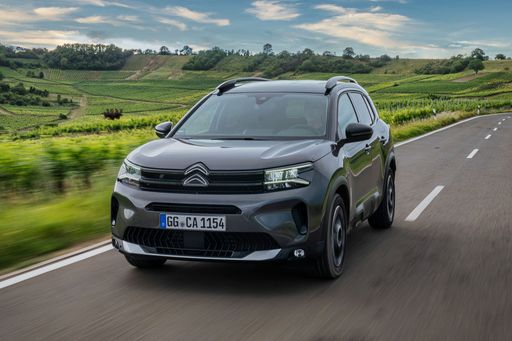
Citroen C5 Aircross
Citroen C5 Aircross
The Citroen C5 Aircross stands out in the SUV market with its distinctively bold design and emphasis on comfort. Its interior is thoughtfully crafted, providing spaciousness and a plethora of features that cater to passenger convenience and enjoyment. With its smooth ride and refined driving dynamics, it offers a relaxing experience for both city commutes and long-distance journeys.
details @ media.stellantis.com
@ media.stellantis.com
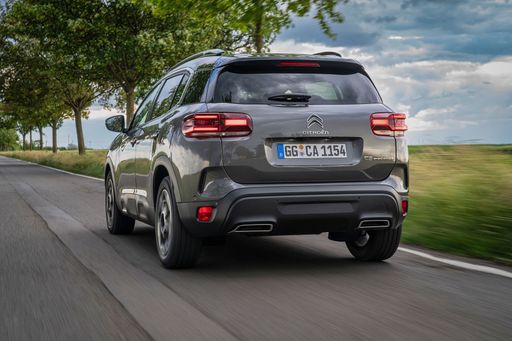 @ media.stellantis.com
@ media.stellantis.com
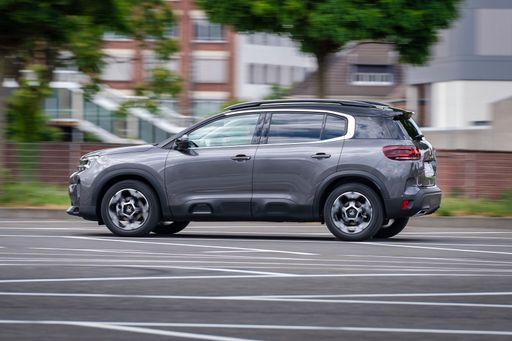 @ media.stellantis.com
@ media.stellantis.com
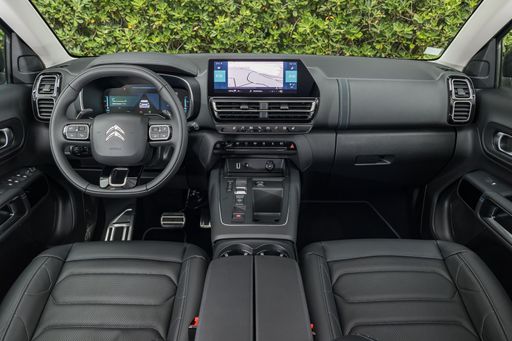 @ media.stellantis.com
@ media.stellantis.com
Ford Puma
The Ford Puma presents itself as a stylish compact SUV with a distinctive design that combines practicality with a dynamic driving experience. Its sleek lines and sporty aesthetics make it stand out on the road, while the interior offers a comfortable and tech-savvy environment. With an emphasis on efficiency and a smooth drive, the Ford Puma is well-suited for both urban commutes and countryside adventures.
details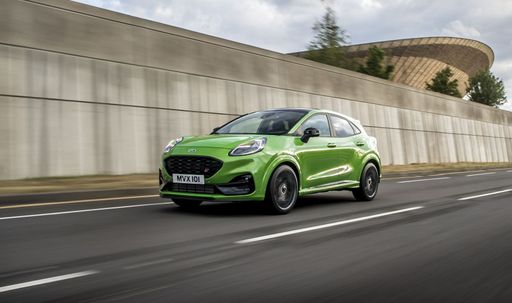 @ puma.fordpresskits.com
@ puma.fordpresskits.com
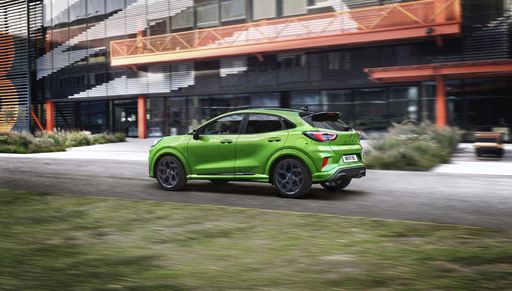 @ puma.fordpresskits.com
@ puma.fordpresskits.com
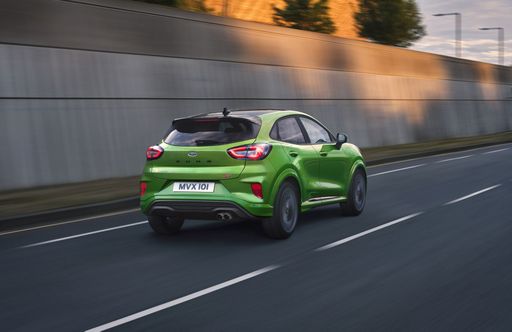 @ puma.fordpresskits.com
@ puma.fordpresskits.com
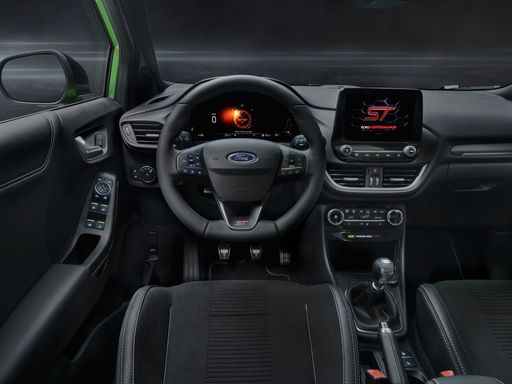 @ puma.fordpresskits.com
@ puma.fordpresskits.com

|

|
|
|
|
Costs and Consumption |
|
|---|---|
|
Price
29100 - 41600 £
|
Price
24800 - 36300 £
|
|
Consumption L/100km
2.5 - 5.4 L
|
Consumption L/100km
5.4 - 5.9 L
|
|
Consumption kWh/100km
17 kWh
|
Consumption kWh/100km
13.1 - 13.9 kWh
|
|
Electric Range
81 - 520 km
|
Electric Range
361 - 376 km
|
|
Battery Capacity
17.8 - 73 kWh
|
Battery Capacity
43 kWh
|
|
co2
0 - 121 g/km
|
co2
0 - 135 g/km
|
|
Fuel tank capacity
55 L
|
Fuel tank capacity
42 L
|
Dimensions and Body |
|
|---|---|
|
Body Type
SUV
|
Body Type
SUV
|
|
Seats
5
|
Seats
5
|
|
Doors
5
|
Doors
5
|
|
Curb weight
1629 - 2184 kg
|
Curb weight
1316 - 1563 kg
|
|
Trunk capacity
565 L
|
Trunk capacity
456 - 523 L
|
|
Length
4650 mm
|
Length
4186 - 4226 mm
|
|
Width
1870 mm
|
Width
1805 mm
|
|
Height
1695 mm
|
Height
1550 - 1555 mm
|
|
Max trunk capacity
1668 L
|
Max trunk capacity
1216 - 1283 L
|
|
Payload
446 - 471 kg
|
Payload
367 - 469 kg
|
Engine and Performance |
|
|---|---|
|
Engine Type
Petrol MHEV, Electric, Plugin Hybrid
|
Engine Type
Electric, Petrol MHEV
|
|
Transmission
Automatic
|
Transmission
Automatic, Manuel
|
|
Transmission Detail
Dual-Clutch Automatic, Reduction Gearbox
|
Transmission Detail
Reduction Gearbox, Manual Gearbox, Dual-Clutch Automatic
|
|
Drive Type
Front-Wheel Drive
|
Drive Type
Front-Wheel Drive
|
|
Power HP
145 - 210 HP
|
Power HP
125 - 168 HP
|
|
Acceleration 0-100km/h
8.3 - 11.2 s
|
Acceleration 0-100km/h
7.4 - 9.8 s
|
|
Max Speed
170 - 220 km/h
|
Max Speed
160 - 210 km/h
|
|
Torque
230 - 300 Nm
|
Torque
170 - 290 Nm
|
|
Number of Cylinders
3 - 4
|
Number of Cylinders
3
|
|
Power kW
107 - 157 kW
|
Power kW
92 - 124 kW
|
|
Engine capacity
1199 - 1598 cm3
|
Engine capacity
999 cm3
|
General |
|
|---|---|
|
Model Year
2025
|
Model Year
2025
|
|
CO2 Efficiency Class
D, A, B
|
CO2 Efficiency Class
A, D
|
|
Brand
Citroen
|
Brand
Ford
|
What drive types are available for the Citroen C5 Aircross?
The Citroen C5 Aircross is available as Front-Wheel Drive.
The prices and data displayed are estimates based on German list prices and may vary by country. This information is not legally binding.
